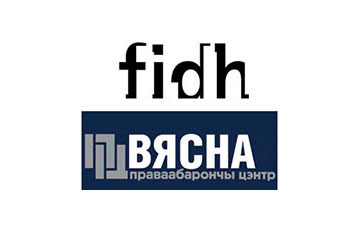FIDH and Viasna: New political prisoners may appear in Belarus at any moment
1- 23.09.2015, 11:49
- 12,489

The EU should not take hasty decisions on sanctions against Belarusian authorities.
Despite the fact that six political prisoners were released on August 22, 2015, on the ground of Lukashenka's pardon decree, five citizens of the Republic of Belarus are being prosecuted on political motives, the statement by FIDH and Viasna human rights centre reads.
Representatives of the human rights organisations welcome the release of Mikalai Statkevich, Mikalai Dziadok, Ihar Alinevich, Artsiom Prakapenka, Yauhen Vaskovich and Yury Rubtsou as an important step for the improvement of Belarus-EU relations and consider it to create favourable grounds for further qualitative change for human rights in the country.
“The European Union has repeatedly asserted the fundamental importance of not only releasing political prisoners but also fully reinstating their civil and political rights for the improvement of relations with Belarus,” the statement says.
FIDH and Viasna think that the objective of the restrictive measures adopted by the EU have not been met yet in the context of 5 politically motivated criminal affairs, continuous harassment against former political prisoners and the civil society in general.
“Particularly at the crucial moment of the presidential elections scheduled for October 11, our organisations call on Member States not to make a hasty decision on the extension or suspension of sanctions before having the possibility to analyse the aftermaths of the elections. Indeed, the ongoing politically motivated judicial harassment of several citizens can at any moment lead to a situation of having once again political prisoners in the country.
On 11 August 2015 the Ministry of Interior detained youth activists Maksim Piakarski, Vadzim Zharomski, Viachaslau Kasinerau and Yaraslau Ulyianenkau, under suspicion of drawing political graffiti on some Minsk buildings. Piakarski and Zharomski were charged under art. 339 part 2 of the Criminal Code of Belarus (viscious vandalism), and were placed in the preventive detention center of the Ministry of Internal affairs. On 31 of August, Piakarski and Zharomski were released under the obligation not to leave the city.
Our organisations believe these activists did not commit the crimes they are charged with. Because they nonetheless compensated the damaged building owners fully and voluntarely, our organisations demand the closing of the criminal case against Piakarski and Zharomski, as well as an end to the judicial harassment against Kasinerau and Ulyianenkau, still suspect in the same case.
Additionally, Ales Mikhalevich, former candidate in the previous 2010 presidential elections, remains charged under art. 293, part 1 of the Criminal Code (organising of mass riots) since 2010. On 8 September 2015 Mikhalevich was arrested by the border police as he was entering Belarus from the Czech Republic where he had been a political refugee since 2011. He was then handed to the Ministry of Internal affairs officers. Though he was released the same day under the obligation not to leave the city, the charges of organising mass riots were not dropped. It has to be noted that Ales Mikhalevich is the last person still charged in the December 2010 mass riots criminal case. All the others charged in this case were either pardonned and released, released after serving their sentence, or have seen the charges against them dropped,” the statement stresses.
Human rights defenders urge the Belarusian authorities to close politically motivated criminal cases.
“We believe that dropping the charges against Ales Mikhalevich would really demonstrate the Belarusian authorities' effort to improve the human rights situation in the country and restore a climate of trust in the Belarusian society.
Our organisations also call on the Belarusian authorities to begin systemic human rights reforms. Additionally, the EU-Belarus dialogue should be subject to clear bench-marks in accordance with the EU guidelines on human rights,” the statement says.








